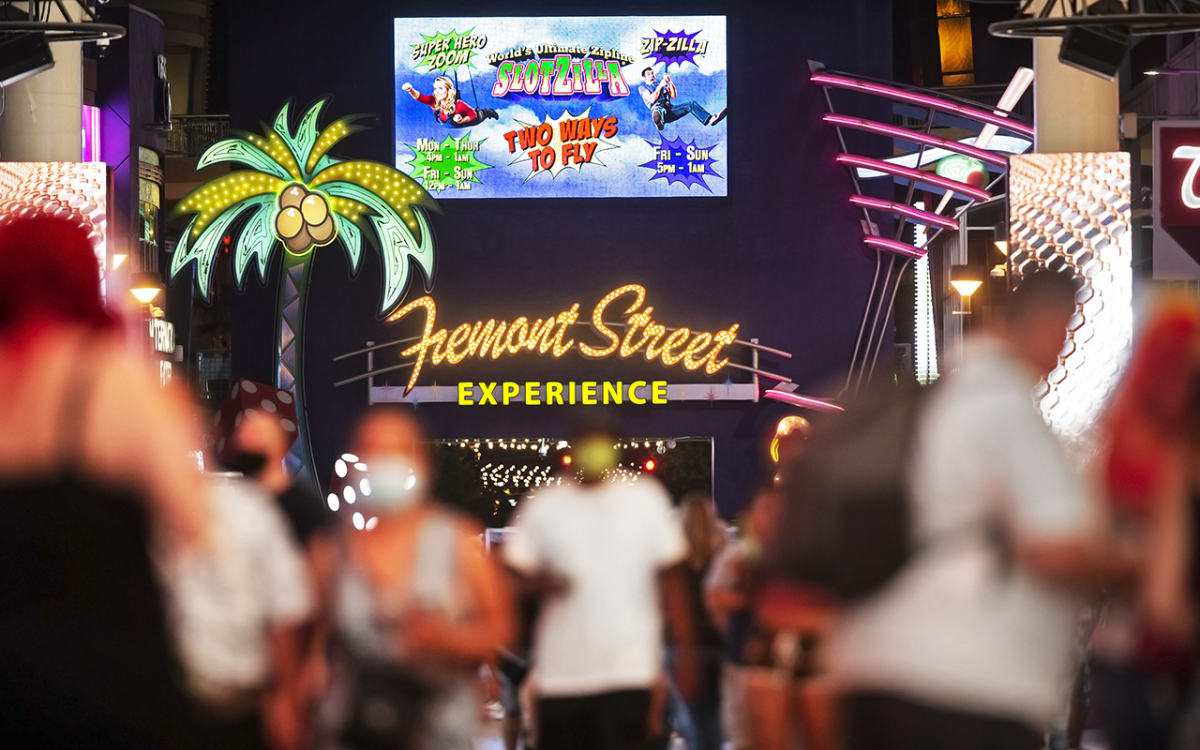Crowds slowly growing as Vegas reopens
Exhale, the insults and $5 Pabst tallboys are back.
It’s 3 p.m. June 11, the first day the Excalibur has reopened since the COVID-19 shutdown put the kibosh on property staples like the counterintuitively titled Fun Dungeon arcade and winkingly obnoxious eatery Dick’s Last Resort, where the snark is as colorful as the stained-glass knights mounted above the casino floor.
Everything here is familiar and a little different at once, the poker tables outfitted with plastic partitions, the socially distanced slot machines, the Fortune Cup Derby Deluxe horse racing game cut from eight seats to four.
In the air, a sort of coronavirus cologne: the scent of hamburgers and disinfectants intermingling, the former supplied by the Johnny Rockets grill, the latter by hotel workers spraying cleansers over just about everything but the hamburgers.
This is the scene as a casino stirs awake after a restless, unwelcome slumber.
It’s one that’s been playing out for weeks now across town, as various Las Vegas institutions resume daily operations, each providing its own chapter in the story of a 24/7 city getting back on its high-heeled feet.
Downtown rebound
They look like metal detectors, sound like them, too, greeting you with an electronic ping when you pass through.
Instead of scanning for contraband, however, the machines check body temperatures.
Lined up at each intersection on the Fremont Street Experience, they’re surrounded by chain-link fencing that funnels everyone through them as they enter this fantasia of football-shaped beers and cantaloupe-sized Mardi Gras beads.
Another new wrinkle for anyone venturing down here to elevate cholesterol levels at the Heart Attack Grill: You now have to show ID at the aforementioned checkpoints to get in.
And so it goes when you’re partying downtown in the COVID era.
These precautions don’t dampen any spirits on a Wednesday night in mid-June, however, when Fremont Street registers as a tequila-abetted testament to Vegas’ resilience in the days after reopening.
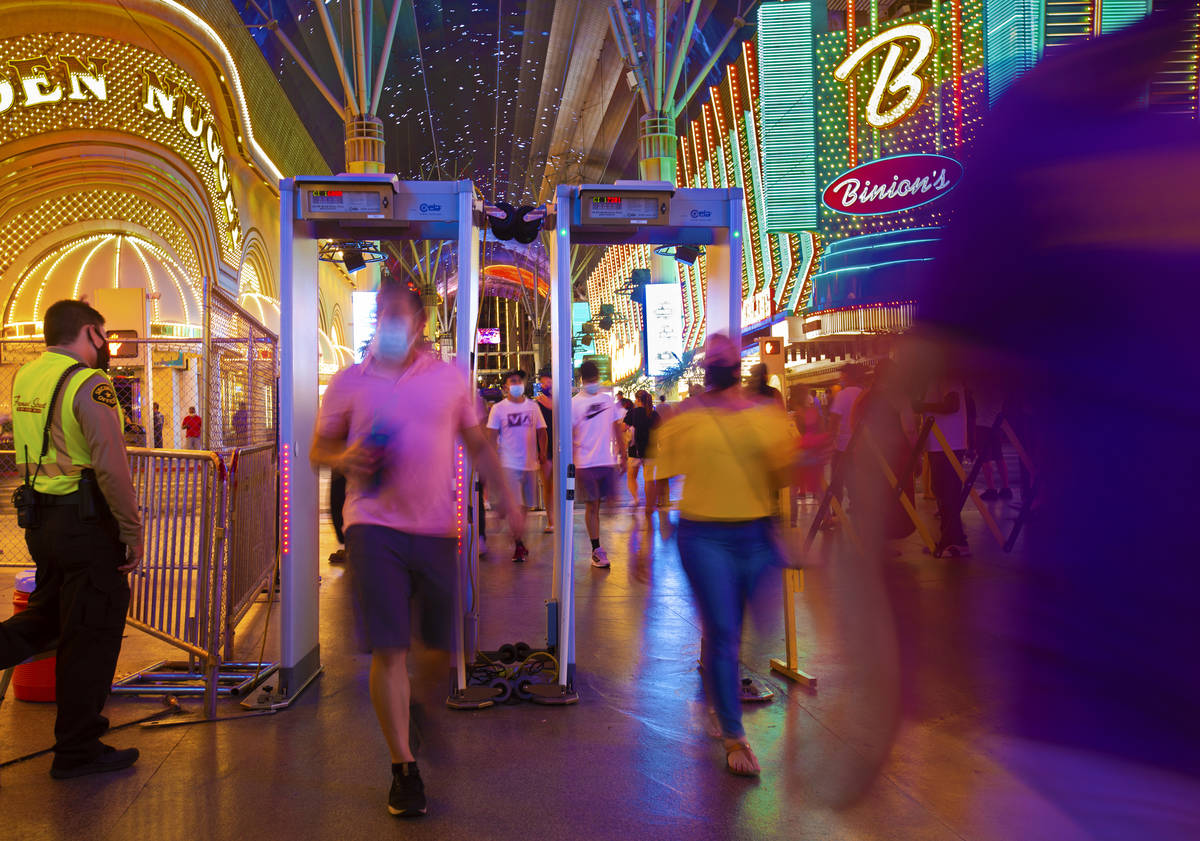
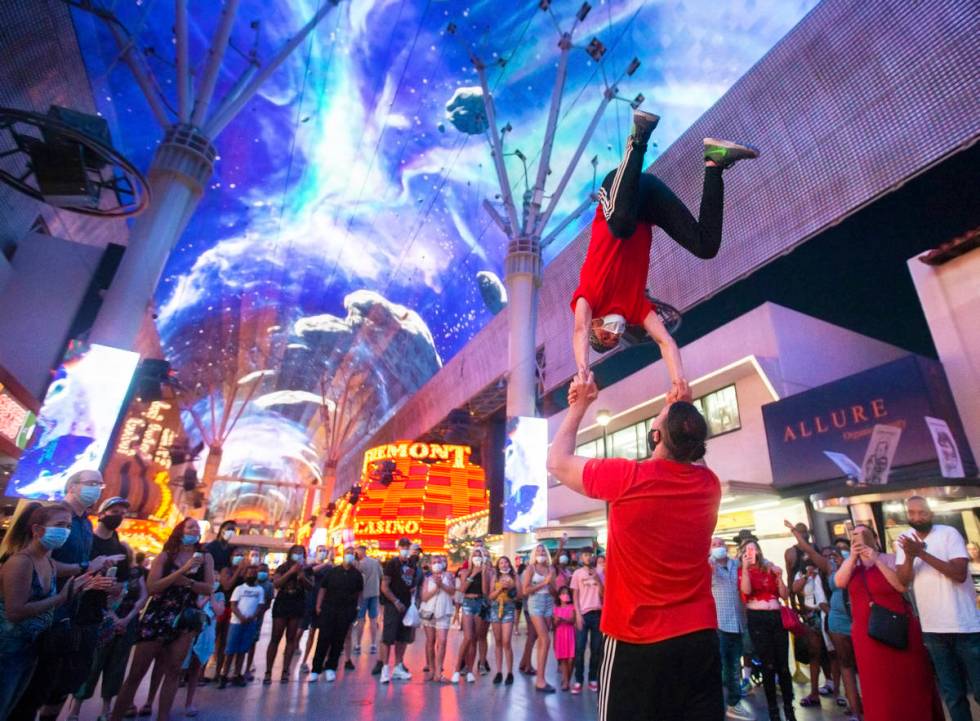
Throngs of revelers crane their necks up to the Fremont Street video canopy to watch geometric shapes melt into one another like the goop from a lava lamp; a DJ does a hula hoop routine in a sparkly body suit between numbers; a dude dressed as Jesus offers salvation for tips.
Among the regulars: Shane Williamson, a street performer who goes by the name of Mazing Hatter the Magician.
He’s been back doing card tricks and making golf balls disappear for five days now, impressed by both the size and generosity of the crowds that’ve flocked back here.
“I was shocked to see how much people were willing to give, even though there had been little influx of money for a lot of people the last three months,” a fedora-clad Williamson says, hand sanitizer and a Rubik’s Cube sitting on a table before him. “It was surprising to see that many people. I had people flocking to my show.”
And the crowds are steadily growing, according to Ricard Gonzalez, a bespectacled Florida transplant who mans an airbrush T-shirt booth.
“Every day it’s a little bit more people,” he says. “I met a lot of people, especially from California. There are a lot of travelers out here, and they’re all happy.”
A few steps away, Noy Cohen peddles some timely wares: illuminated face masks pulsing with images of skulls and marijuana leaves.
When asked for his thoughts on how Fremont Street has rebounded so swiftly in terms of foot traffic, he seems almost incredulous, as if he’s just been hit with a rhetorical question.
“It’s Vegas, man,” he says. “Vegas is Vegas.”
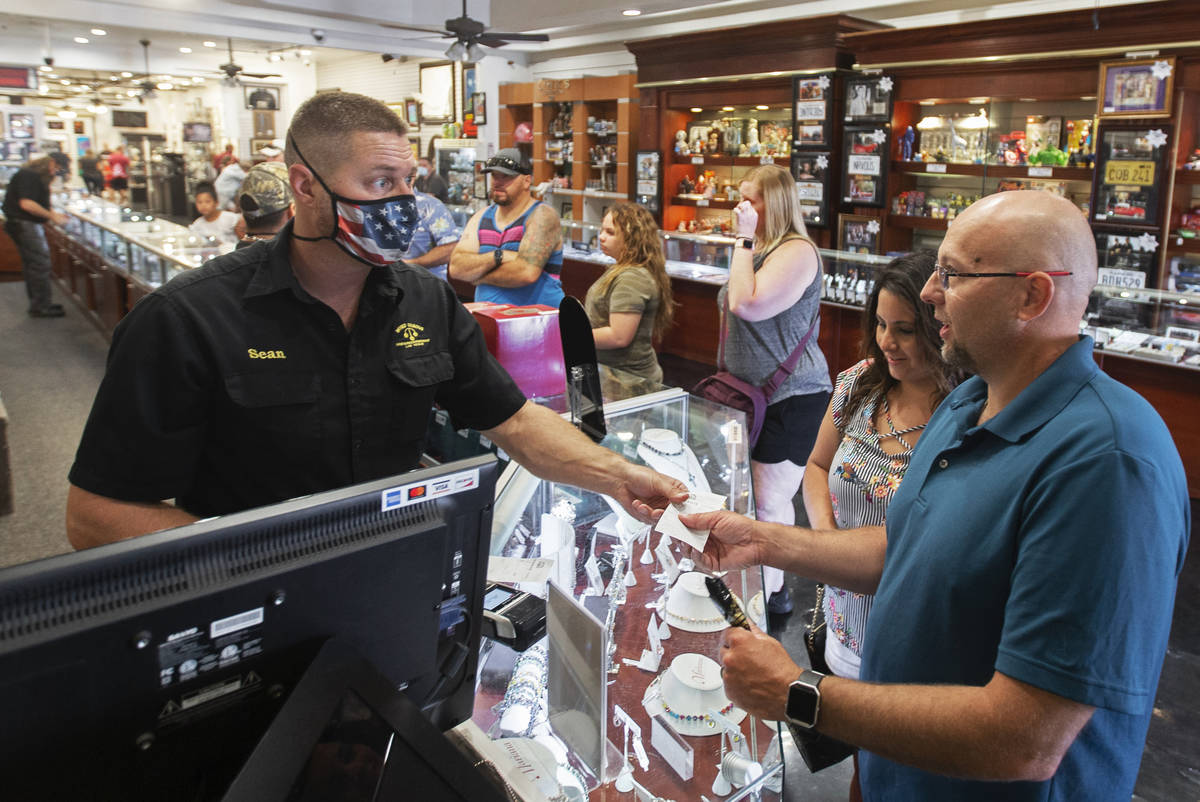
‘Pawn Stars’ and pool parties
The shelves are bare where the T-shirts should be, salted with a thin layer of dust.
The “Pawn Stars” branded merchandise usually displayed here is largely piled behind the counter now, stacked out of view.
A corner of Gold & Silver Pawn Shop, made famous as the home of the aforementioned hit reality TV show, remains barren in a room that’s like a dam-burst of collectibles, from classic Atari games to Donald Trump boxing bobblehead dolls to Benny Binion’s hat, the only thing here that’s not for sale.
“Normally we’d have a whole department over here for that,” says Andy Zimmerman, the store’s general manager, eyeing the spot in the shop where the show’s themed souvenirs are normally displayed. “We have racks, we have boxes, a whole area. We have not opened that back up yet.”
“Pawn Stars” merchandise is largely sought by tourists, with foreign visitors being a particularly large demographic.
“This time of year, a good portion of our business, because the show is on in 150 countries, is international,” Zimmerman explains. “Anywhere from 40-50 percent of the people walking in the door are international, so we’re obviously going to miss out on that this summer.”
There’s a solid crowd here on a Tuesday morning in mid-June, though the usual line of people waiting to get in that frequently snakes around the store is missing.
While tourism is clearly resuming in Vegas, as the bustle of Fremont Street attests, the resurgence is driven by those traveling by land.
From March to April alone, the number of passengers at McCarran International Airport plummeted from more than 2 million to 152,000.
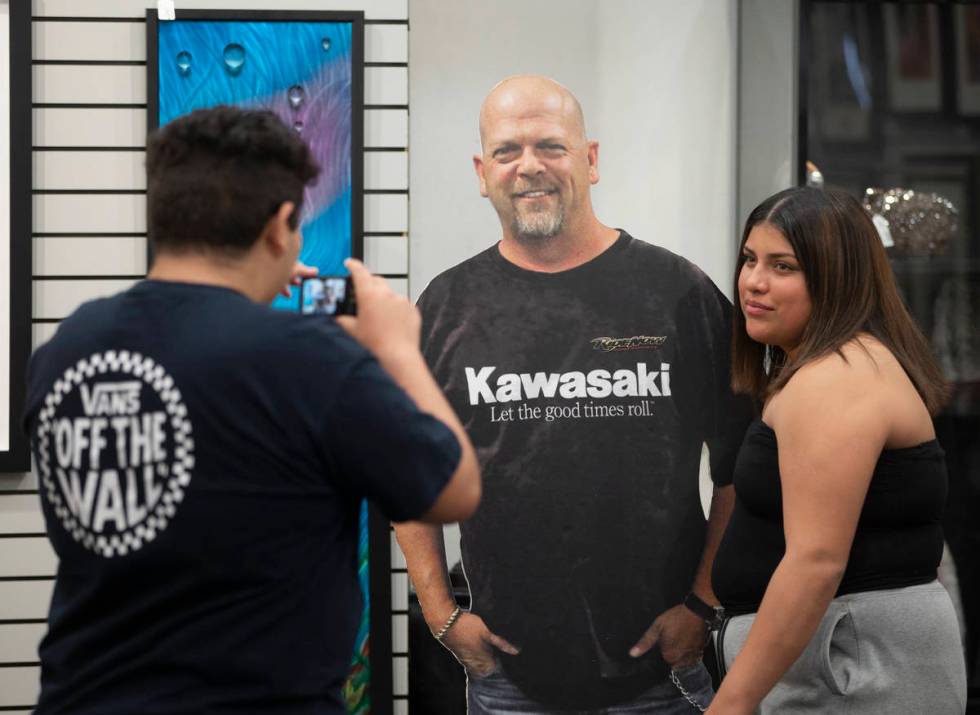
With a measure of international travel restrictions still in place and a reluctance by some to resume air travel — a recent survey by San Francisco-based Destination Analysts found that 61 percent of respondents considered traveling on a commercial airliner unsafe — those numbers aren’t likely to skyrocket any time soon.
“For this time of the year, I would say we’re 20 to 30 percent of what we would normally have in terms of head count coming through the door,” Zimmerman notes. “I would say 90 percent of the people who came in the store were local or drove in from somewhere.”
There are the first hints of a turnaround, though, he says.
“We’re starting to see a little bit of people — because we always ask — coming in via airplane,” says Zimmerman, who has lived in Vegas since 1990. “The town always comes back.”
Zimmerman isn’t alone in noting the incremental progress.
Tao Group Hospitality partner Jason Strauss recalls the opening of the Marquee Pool at The Cosmopolitan of Las Vegas in mid-June, one of the first daytime party spots to relaunch after the coronavirus quarantine.
While it was not the traditional high-energy dayclub experience that has become synonymous with Vegas in the spring and summer — no dance floor, limited capacity, a pool lounge rather than a pool party vibe — Strauss notes that guests flew in from around the country to be there.
“I think of our 10 grand cabanas, three of them were from the East Coast,” he recalls. “In my cabana, I had three friends fly in from New York. It was so great to see.”
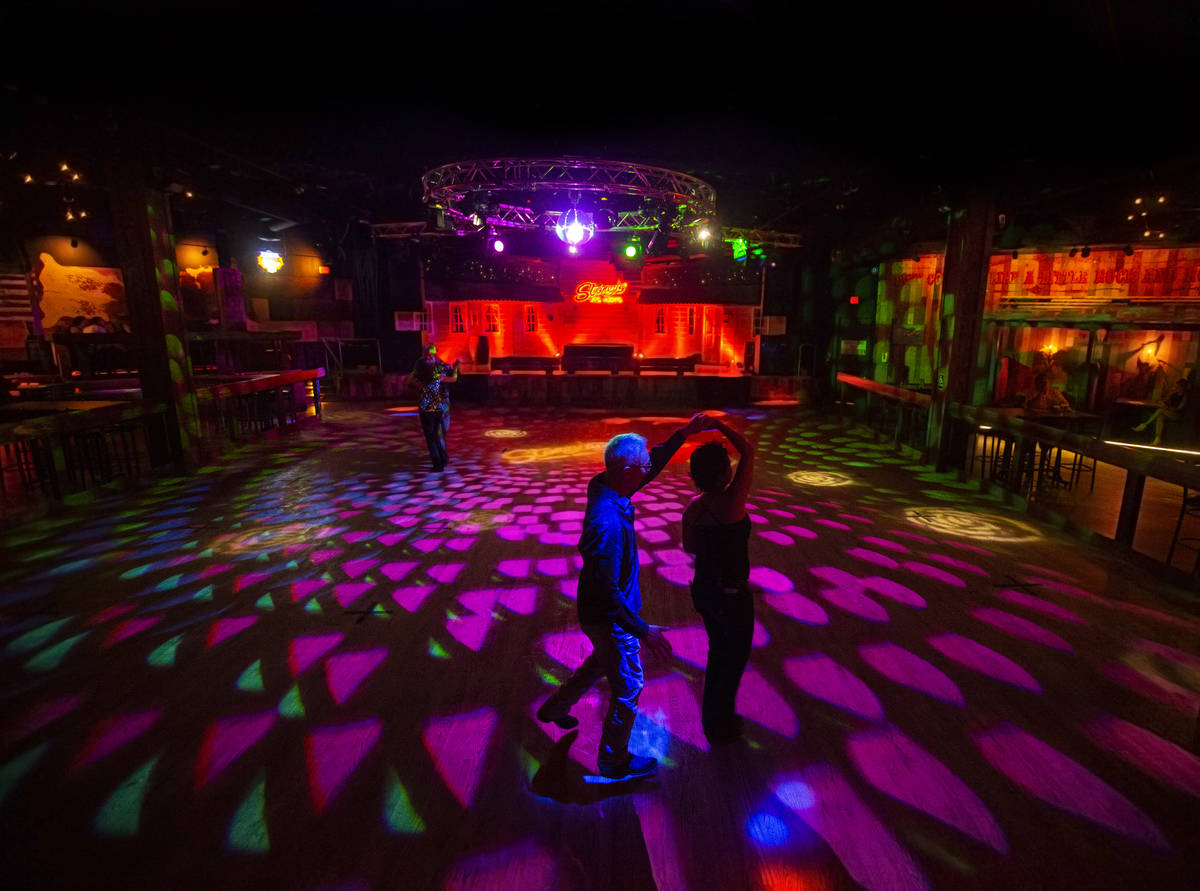
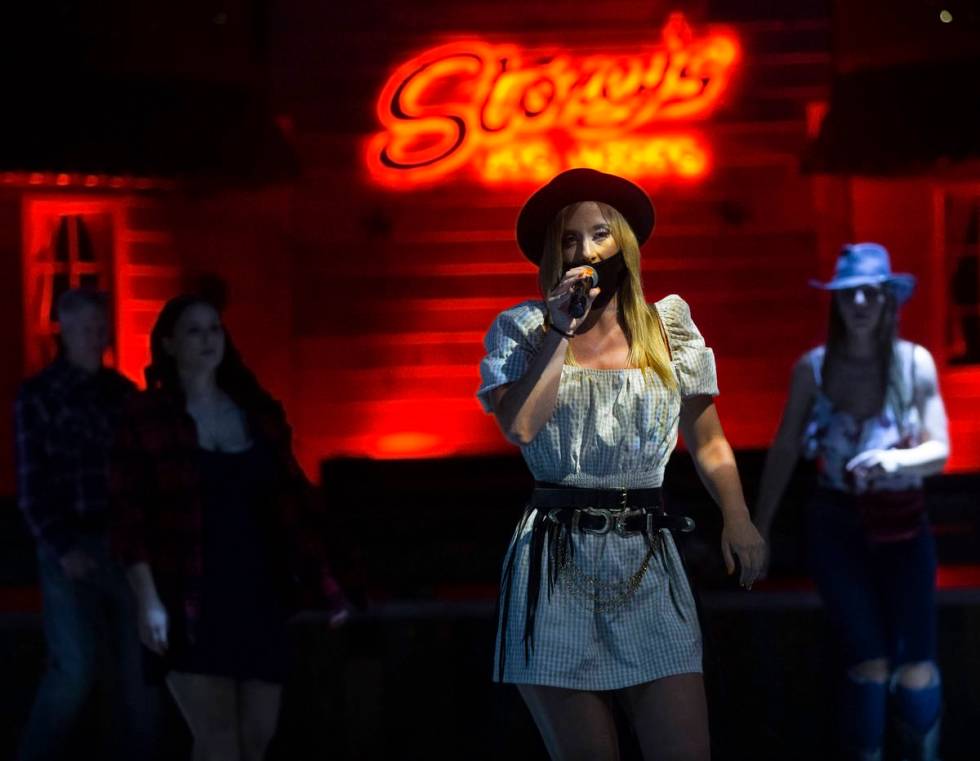
Cowboys and punks
A week ago came the command: Get the duct tape.
It’s 7 pm. on a Friday in late May at Stoney’s Rockin’ Country, the first night patrons can sit at the bar and have a Budweiser.
They’re not here just to drink, though. They’re here to dance. Hence the duct tape, which Stoney’s owner Chris Lowden had cut up into a series of X’s and placed on the dance floor in 6-foot intervals to ensure social distancing.
This is how you do the “Ride the Donkey” in the age of the coronavirus.
Soon, a line dancing class begins.
“It’s like I have a sock in my mouth,” the instructor says of the challenges of addressing her denim-clad charges while wearing a face mask.
That’s not all that’s different on this night. The sawdust has been swept up off the floor for sanitary reasons, and the mechanical bull remains idle.
“Every day, I look at it and go, ‘What if I just had like a giant bag, somebody rides it, and we take the bag off?’” Lowden wonders of the bull.
Despite all the adjustments that Lowden has had to make to keep his business running during quarantine, he admits that it might have been more financially prudent for him to simply close shop. The now-shuttered Alehouse sports bar, within view of Stoney’s in Town Square, did just that.
But Lowden’s staffers persuaded him to keep the lights on.
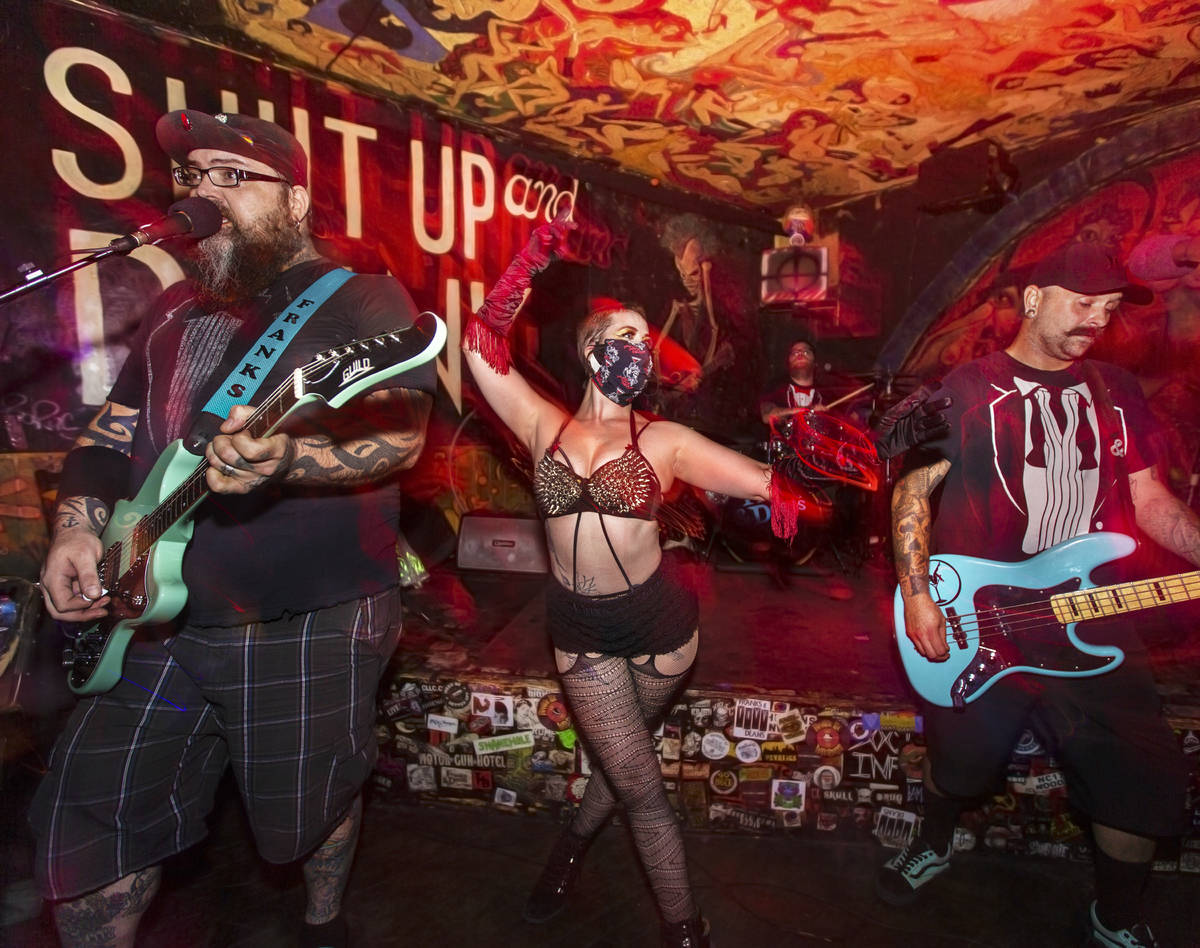
“There’s been people that have been with us since we’ve been open. They’re almost like family,” he says. “They’d just rather work. We figured it out, how to make this thing not lose a bunch of money, maybe even try to break even.”
With his landlord working with him on rent, Lowden says he can break even if he gets at least 200 customers a night Thursday-Saturday, when Stoney’s does most of its business.
They’ve been hitting that number of late.
“I guess we’re going to see how this all shakes out,” Lowden says. “But I know I’ve got a core group of pretty happy employees.”
While Stoney’s isn’t hosting bands just yet, five days later, venerable dive bar the Double Down Saloon, which is to punk rock what Stoney’s is to country in Vegas, resumes business with a show by locals Franks & Deans, best-known for punk rock versions of Rat Pack staples and more.
Live music has offically returned to Vegas.
“I will never be able to describe the joy I felt to be able to play in front of people again,” Franks & Deans frontman Jordan Hoss says, even if the venue was limited to 75 people.
“(P.) Moss, the owner, was there, and he and I kind of looked at each other at one point and I just went, ‘This is perfect,’ ” Hoss adds. “The people who are here are so stoked and so grateful to have some semblance of having fun again.”
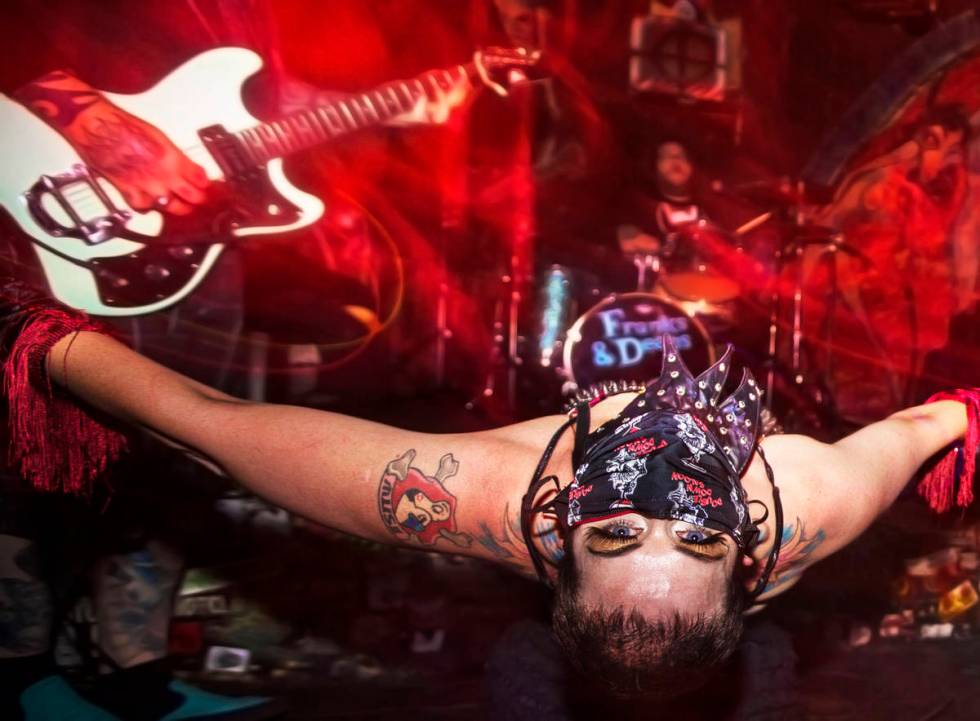
Fight nights
The crowd roars from the couch, arena empty, voices full.
It’s June 9, and for the first time in 108 days, boxing is back in the boxing capital of the world.
In the main event, U.S. Olympian Shakur Stevenson uses his vastly superior hand speed to drub challenger Felix Caraballo as effortlessly as if his opponent’s feet were anchored in concrete.
It doesn’t look or sound the same. The action is taking place inside “The Bubble,” aka the MGM Grand Conference Center, where the coronavirus security measures are as tight as the clenched fists being whipped around the ring.
There are no fans in the stands, but you can hear them nonetheless. A new app called Hear Me Cheer enables those watching from home to yell, scream and cheer into their phones or laptops. Their voices are then piped into the venue’s sound system and the TV broadcast.
“It’s a completely new world,” says Brad Jacobs, COO of Vegas-based boxing promotions company Top Rank, which has been hosting two cards per week here since the Stevenson show.
Once fighters and their two-man teams get to Vegas, they’re tested immediately, then quarantined in their hotel rooms for 10 hours, their rooms located on a private floor of the property, accessible only through a secure elevator. They travel to the venue — where all training, weigh-ins and food service takes place — in sanitized vehicles.
On fight night, the corners of the ring are disinfected after each bout, gloves and hand wraps are treated as biohazardous material and are disposed of immediately at end of the night. The entire room is sanitized via UV lighting.
With 150 people being tested for the first card alone, there’s plenty to account for.
“Overall, it’s about a 350-item checklist of things that we do for our regular shows, adding in all these new things that we have to do to ensure the safety and health of our staff, ESPN production staff and, of course, the fighters and the fight camps,” Jacobs says.
Still, there have been setbacks. Undefeated boxer Mikaela Mayer was set for the co-main event on the Stevenson card, only to have her bout pulled after she tested positive for COVID-19 two days before the fight. Another bout in later weeks was nixed after a boxer’s manager tested positive.
Mayer’s fight was rescheduled for July.
Call it rolling with the punches.
“We got the result at 7 a.m. At 7:01 a.m., she was notified,” Jacobs recalls. “In a couple hours, she was packed up, out of the hotel, into a different hotel, had to rent a car for her to drive home by herself on a 12- to 14-hour journey because she couldn’t fly.
“It all went exactly how we planned it to go,” he adds. “The preparation has paid off.”
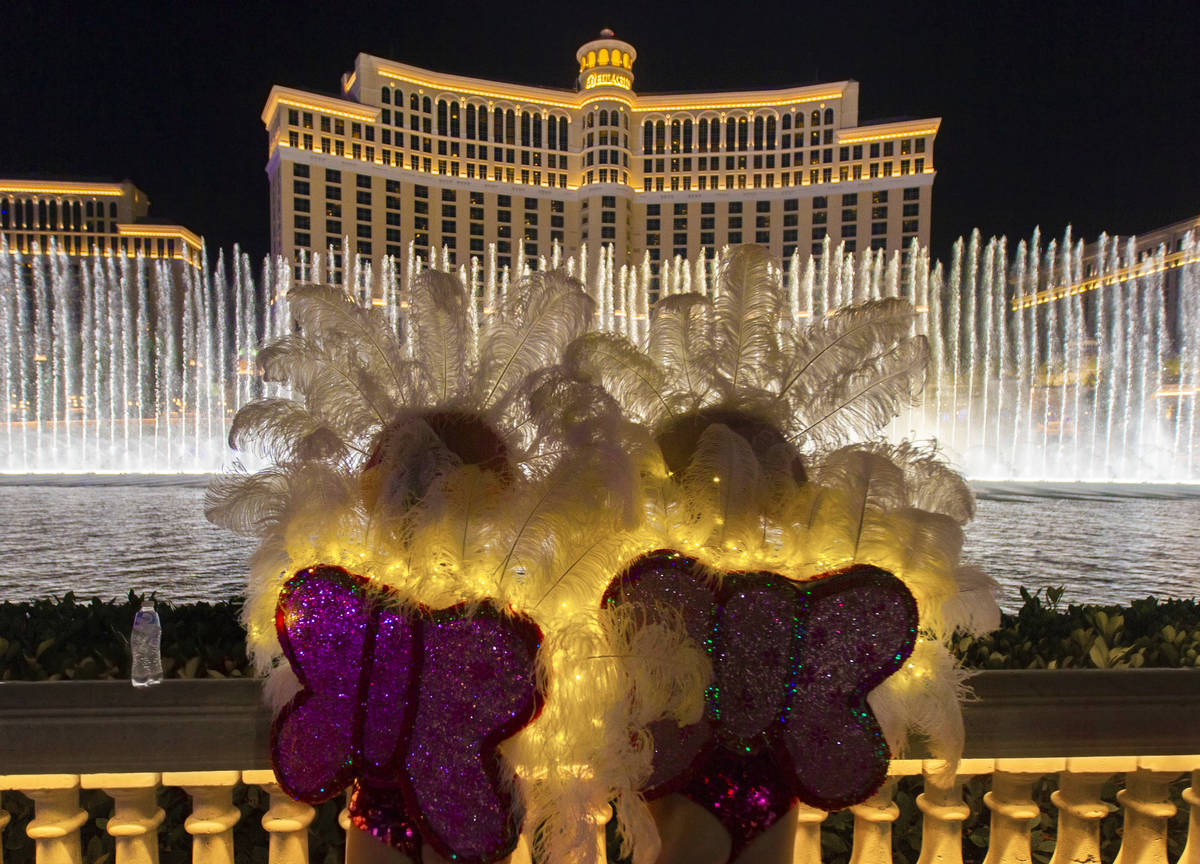
A stripped-down Strip
It’s an early-June afternoon hot enough to make one seriously contemplate wading into the Fountains of Bellagio, in front of which Joe and Lorain Homas currently stand.
The Orange County, California, couple planned their Vegas trip just three days ago, lured here by low hotel prices.
Though Joe Homas bemoans the fact that not everything in the city has reopened by this point, he cites a silver lining.
“It’s nice that you can actually see the fountain show without being, like, four rows back or whatever, like normal,” he says.
“Normal.”
That continues to be a relative term these days as the city revives itself in myriad ways. The reopening of Las Vegas has been a fitful one.
Gov. Steve Sisolak mandated that face coverings be worn in public beginning June 20, after the number of new COVID-19 cases in Clark Country spiked to nearly 15,000. That prompted Sisolak to extend Phase Two of reopening in Nevada likely through the end of July.
The reverberations are still being felt throughout the valley.
At the Welcome to Fabulous Las Vegas sign at the south end of the Strip, about a dozen or so people line up for photos.
Shawn Falwell, a Michigan native, poses for a portrait with his wife and daughter.
Falwell, owner of America’s Marketing, is in town meeting with casino execs to drum up business for the city by helping facilitate tourist travel from his home state.
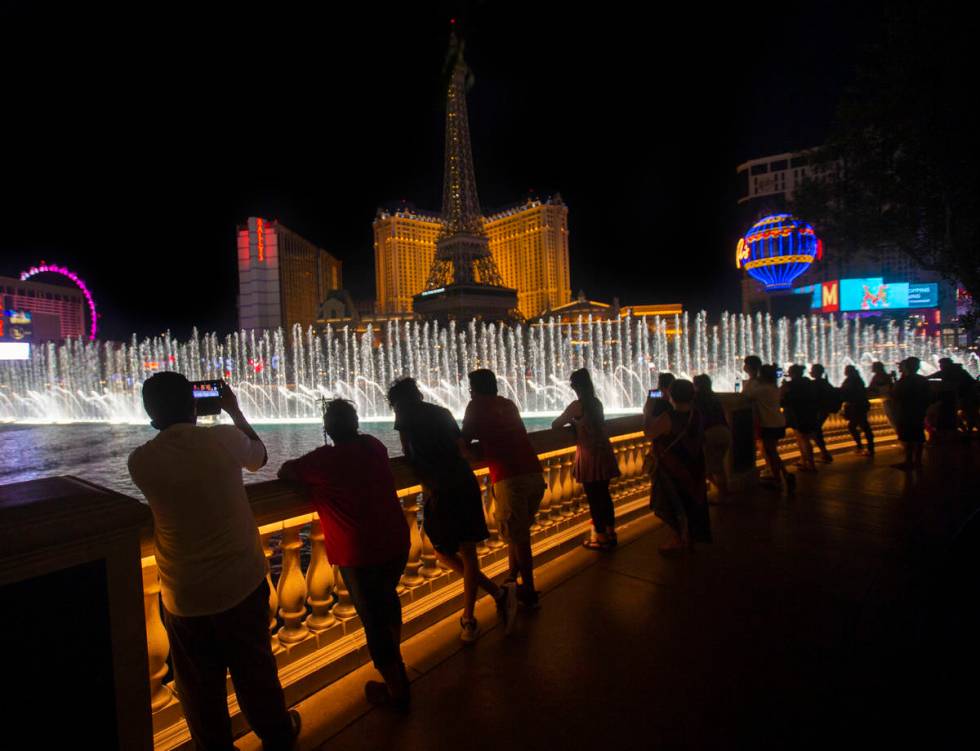
“I want to find out how I can help this particular area bring snowbirds down and make them feel comfortable again,” he says.
“I think people just want to get traveling, because we’ve been locked down. A lot of people are scared. They don’t know what to do, but they want to get out.”
Nearby, Nacho Garaghan, a professional photographer, offers his services for tips.
He’s been back on the job since May 10 and has seen the makeup of the crowds shift gradually from when the town was still on lockdown to now.
“Most of the business was local people coming on bicycles just to get out of their houses,” he says of what it was like here a month ago. “This past week, it’s been tourists from all over: California, Wyoming, Alabama, Texas.”
Predictably, he’s not as busy as he was before the pandemic.
“Before, I was shooting 1,500 shots,” he says, and was frequently joined by six or seven other photographers after sunset. “Now, I’m alone at night, or we are two, and I’m shooting 600 shots.”
Nevertheless, he says business has been picking up on an almost daily basis.
The story of Las Vegas’ recovery is still being written, of course.
The ink continues to flow.
“People are still coming,” Garaghan says. “You cannot stop what the city is built for.”



